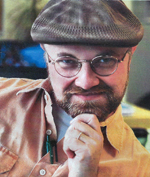By Eric George Tauber

SAN DIEGO — Honky is coming to the REP, opening Nov 7 th. I recently spoke with its white playwright, Greg Kalleres. He grew up in an upper-middle class suburb of Indianapolis. There are very clear-cut lines dividing the demographics of neighborhoods in this society. Which side of “the tracks” you grow up on largely defines who you are and what potential your future holds.
GK: Growing up, I was told, ‘You have every advantage.’ As you grow up, you come to realize what that means. Not everyone has the same advantages and the color of your skin makes a big difference.
Kallares described Honky as “a satire about race and commercialism, white guilt through the lens of sneaker advertising, pointing out the absurdity of our discomfort with race in this society.” He drew from his experience as a copyrighter for an ad agency.
GK: People have a fear of being called ‘racist’. We were marketing to non-white people, but the industry is overwhelmingly white. And they were terrified of the words that they used. Should they say ‘black’ or ‘African-American’? Asian? Or should they be more specific?
…The character of Peter is me x 100. To sell sneakers, he effectively glorifies gang violence to reach out to blacks, but it attracts mostly affluent whites. Then a black kid is killed for his shoes and they quote that commercial. Peter feels terrible, so he goes to see a therapist. When the therapist turns out to be a black woman, he doesn’t know how to talk to her. Everything he says to her becomes an ad for how he’s not a racist.
The therapist sees mostly white clients. But she tries not to see herself as someone who helps white people, rather as someone who helps ‘people with problems.’ … Andie, Peter’s fiancée, has no filter. She talks non-stop and says offensive things. But she doesn’t know that she’s being offensive and the comedy is in how people react to her.
EGT: Why ‘Honky’? I don’t think I’ve heard that word since they cancelled The Jeffersons.
GK: The last time I heard it was in Death Wish 3. …The truth is there’s no word to offend a white person that carries the same weight.
EGT: There is a double-standard with the use of the ‘N-word.’ I heard some black teenagers using it repeatedly and I realized that if you put the same script in the mouth of a good-old boy in a pick-up truck, you’d call it ‘hate speech.’”
GK: There’s a scene about that in the play. …Why would you want to say it? Well, there is power in owning the word. ‘Nigga’ is different from ‘nigger’ and it’s not offensive if they’re saying it to each other because they’re taking something that’s been used against them and owning it.
… In the play, a pill comes out that promises to cure people of racism. Does the pill work, or does taking it exempt you from racism because you’re on the pill?”
(EGT: Reflecting privately , I thought it would be nice if there were a pill to cure racism or anti-Semitism. In the Jewish community, I’ve never heard us playfully call one another “kike” or “Christ-killer.” I’ve heard some try to exempt themselves from the charge of racism as members of another persecuted minority only to reveal their own bigotry as they go on about “those people.)
EGT: Do you feel that you understand black culture better after writing this play?
GK: I’m an idiot when it comes to this stuff. It’s a conversation starter. This play won’t solve the problem of racism, but talking about it helps. When we premiered the play in New York, everyone -the whole audience- stayed for the talk-backs and produced a wide variety of reactions.
… The issue of race -much like love- can turn people into idiots. People are so uncomfortable talking about race. Because it’s so tense, it’s great material for comedy.
Kalleres will be there in person for the talk-backs opening weekend and again Thanksgiving weekend.
*
Tauber is a freelance writer who specializes in coverage of the arts. He may be contacted via eric.tauber@sdjewishworld.com